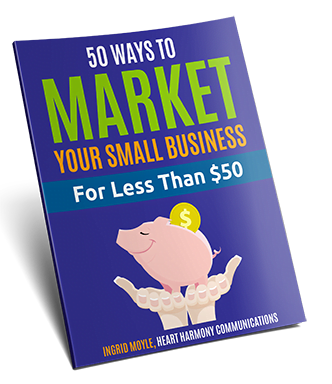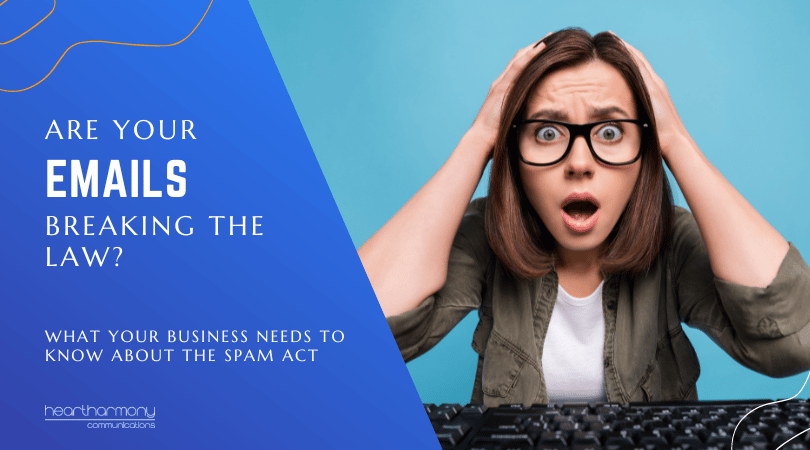Should you delete or respond to unsolicited emails promoting SEO, App development web design, or sponsored posts? Here’s what to look for & how to respond.
Unsolicited emails are the scourge of every business owner’s existence. But what about unsolicited emails that sound vaguely legitimate because they talk about your SEO or your marketing? Should you ignore them? Respond to them with a “no thanks” or take them up on their offer?
The vast majority of unsolicited emails to a business fall into the scam, spam or simply annoying category. (There are also unsolicited invoices for business registration renewals that fall into the questionable category.)
Here’s a quick run through of some of the many emails that you should ignore and instantly delete without the slightest twinge of guilt and without giving the email more than 0.25 of a second of thought.
How to identify a spam or scam marketing email
- You did not ask for the information or request to be on the company’s mailing list. This is called Spam and breaches the terms of the Spam Act.
- The email looks like a cookie cutter template email that you can tell has been sent to thousands of other companies.
- The sender is often overseas (India) or they pretend they are based in your country (Australia). They may even include an address to try and make you believe it is real. Newsflash! They aren’t in Australia no matter how much they may protest or deny or call their operators Bruce or Charlene.
- The emails often have poor spelling and grammar. If they are that bad with their outreach emails, imagine how amazingly bad they would be representing your business online through blog posts or other SEO or marketing strategies.
- The emails often have random capitalisations, strange highlighting or font changes and have a liberal use of bold text scattered like discarded confetti after your cousin’s fourth wedding through their emails.
- They make unrealistic claims such as “Guaranteed 1st Page Ranking on Google”. There is no way that anyone can guarantee this result. It is simply impossible with how the search engines are now designed.
- They often make vague threats about bad links pointing to your site, broken links, duplicate content, keywords not on the first page, errors or issues with your site without specifically giving you any details.
- They often offer free reports or consultations to try and suck you in. These reports or consultations are as trustworthy as the free consultations the Microsoft virus call centre operators offer and should be ignored.
- They are often sent using generic email addresses such as Outlook, Yahoo, Gmail and not a company email. Or, while the email address may “look” ok at first glance, when you hover over it you see that the true email address is very different to what is stated.
- If there is a website that they refer you to, it looks dodgy and unprofessional.
- They may include your website URL in the email (which usually is taken from your email address). This is an automated bot action, so don’t think you are special or that they have actually looked at your website.
- No proper address or phone number is included as a way to contact the person.
- They often say, “we are not scammers.” Methink they protest too much!
If you get any emails with these red flags, chuck them straight in the bin without responding to them. Do not pass go. Set up a rule if you have to, so your email program does the trashing automagically for you.
Do NOT click any links in these emails as often the links can take you to malware or phishing-related locations.
Scamwatch is an Australian Government website that has great information on how to spot different scams.
The Australian Cyber Security Centre has a stack of resources and training for small to medium businesses on cybersecurity, phishing emails and how to identify potentially malicious emails.
A word on trying to unsubscribe from scam marketing emails
Many of these emails include a line in the bottom of the email telling you to reply with a “no” or “remove” if you want to taken off their email list.
Do not respond to spam emails to ask them to remove you because then they have confirmed you are a legitimate email address. They will then sell your email address to the “buy-a-list scammers” as a confirmed email address, which means you will start to be bombarded with even more emails.
The safest option is to simply delete and block the senders.
Emails to Instantly Delete: SEO Company Emails
SEO company emails have replaced the male enhancement emails as the most annoying spam emails on the planet.
Most businesses get a number of these each week, with a few variations on the same theme.
If you don’t respond, you then get a series of automated follow-up emails at pre-programmed intervals, to make you think that they are legitimate. Don’t be fooled!
No quality or legitimate SEO company would stoop to using these tactics.
If you get an unsolicited email from an SEO company, you can 100% guarantee that they are a dodgy brothers company who “may” get you an initial hit on Google before crashing your website into internet oblivion.
If you get an email from am SEO company, it simply means you can instantly cross them off your list of preferred suppliers.
How do you find a good SEO company? Ask for referrals and be prepared to have very deep pockets.
Good SEO companies start at more than $500 a month, and are few and far between. The SEO companies in Brisbane I recommend can be counted on one hand with a couple of fingers chopped off.
Dodgy SEO companies have become such a scourge that the ACCC has flagged them as particular problem areas for small businesses to be careful around.
SEO Company Wall of Shame

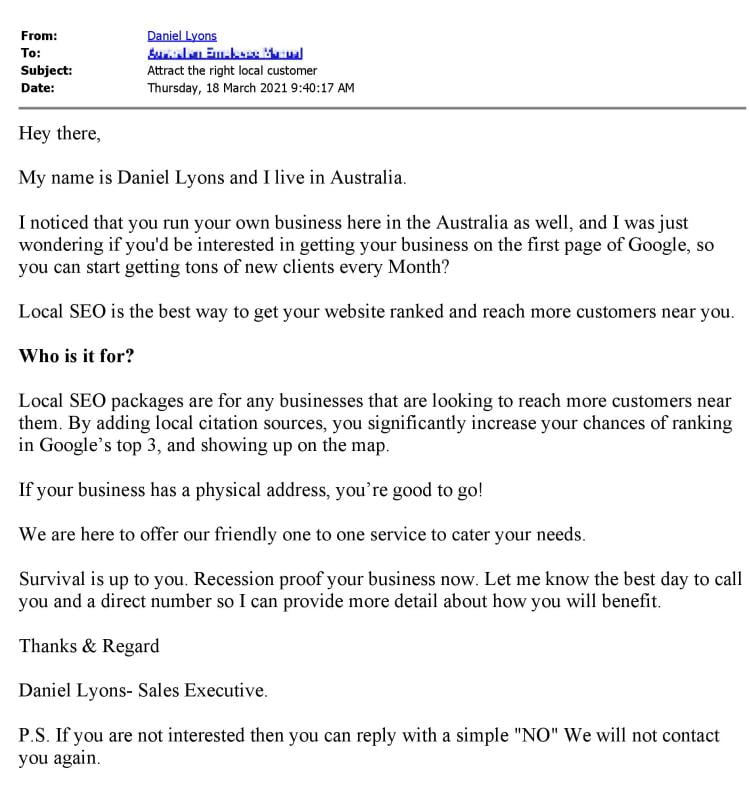
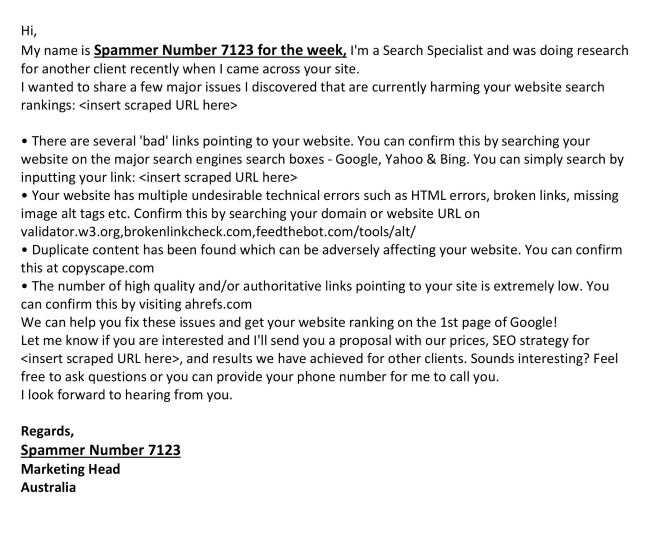

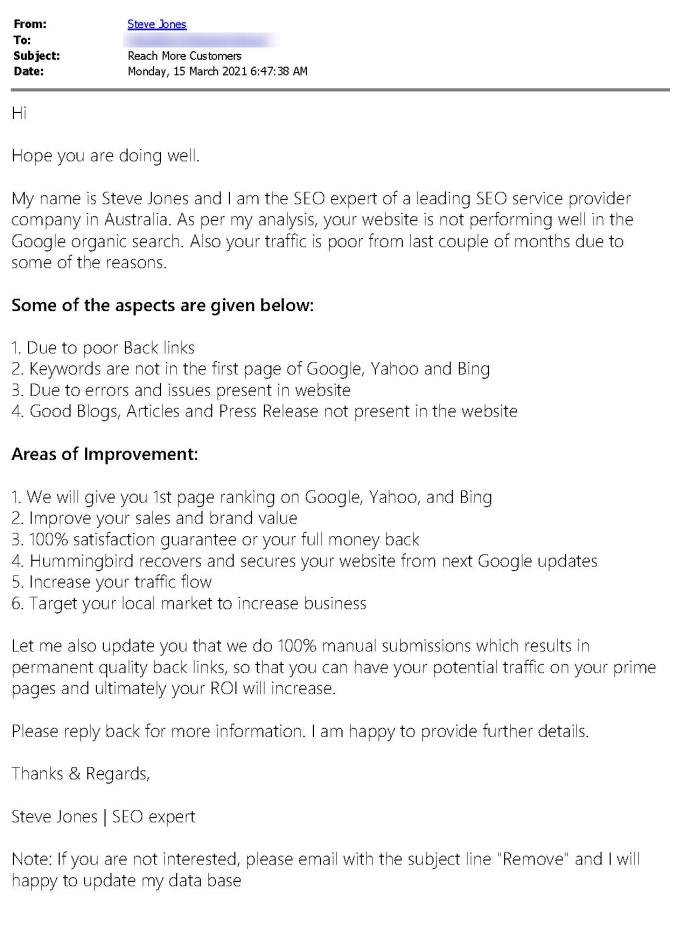
The Buy-a-list/Lead Company Emails
The buy a list/buy
The problem you find with most list or lead generation companies is that there is no guarantee that people joined the lists knowingly, willingly and expected to be contacted into oblivion.
Yes, there are reputable list companies, but they are incredibly few and far between, and their services attract premium rates because of all the hoops they go through to do things the right way.
Most small businesses don’t have the budget or know the questions to ask to find out if the company is reputable, so it is safer to leave this marketing strategy to the side of the plate.
Want to know more?
If you want to grow your email list ethically and safely, then check out our tips!
Buy-a-list/Lead Wall of Shame
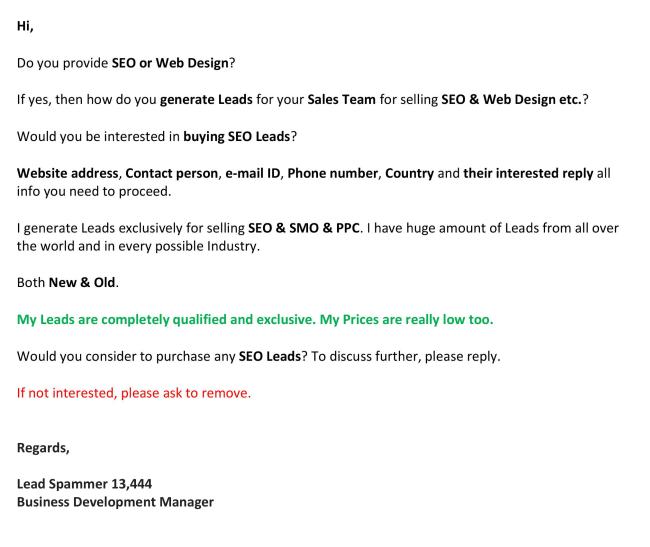
The Buy A Blogger Companies
There is a another round of spammers flooding inboxes. These offer to buy you a blogger or sponsoring content. Sponsored content means you pay a blogger to say nice things about you and your business. The Kardashians do it, so it must be legit!
Sponsored content is an area the ACCC is cracking down on, purely because it sneaks under people’s advertising radar.
If someone who is Instafamous promotes a product, then people buy it in droves, without considering if the product really is that good or useful.
If it is glaringly obvious that it is an ad, then people’s defences go up. Hiding the ad means it sneaks through the defence shield. That’s why the ACCC and the AANA are taking a tough stand on sponsored content.
Read more about sponsored content requirements in advertising.
Sponsored content is a strategy to use with caution, and even more so if an unsolicited email (can we sing a chorus of Spam, Spam, Spam) offering to sell you a blogger lands in your inbox.
Sponsored Content Wall of Shame
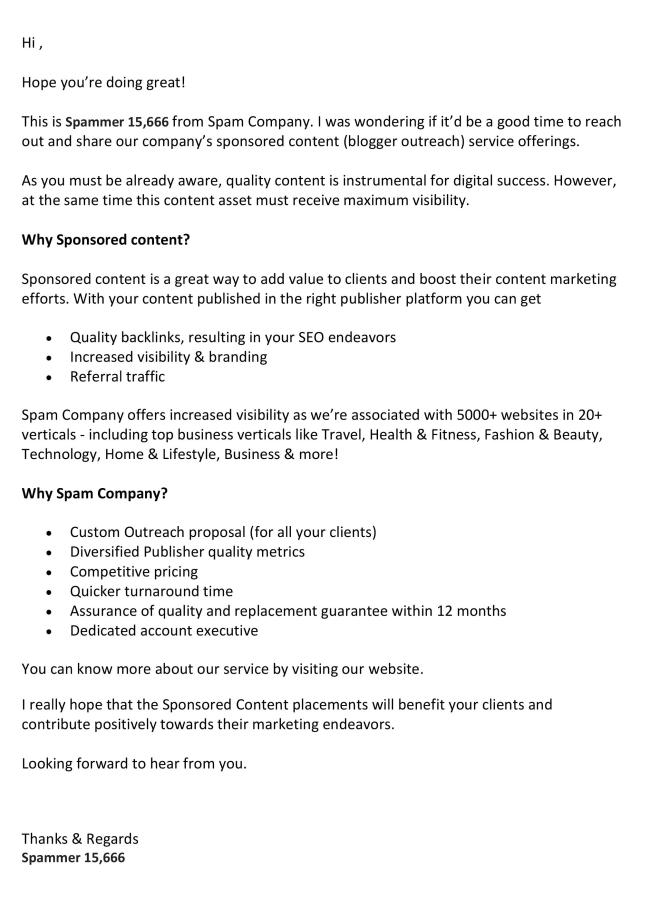
The Mobile App Development Companies
The mobile app development company spammers have been around for years – and their spam email strategies have not developed in any of those years.
These people offer to build you an app, for a teeny tiny fee. Most small businesses will never get
App Development Wall of Shame
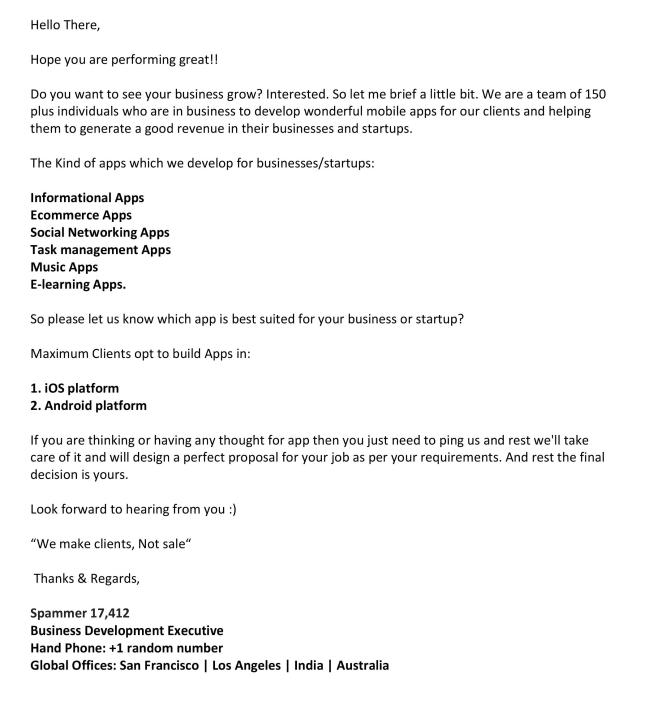
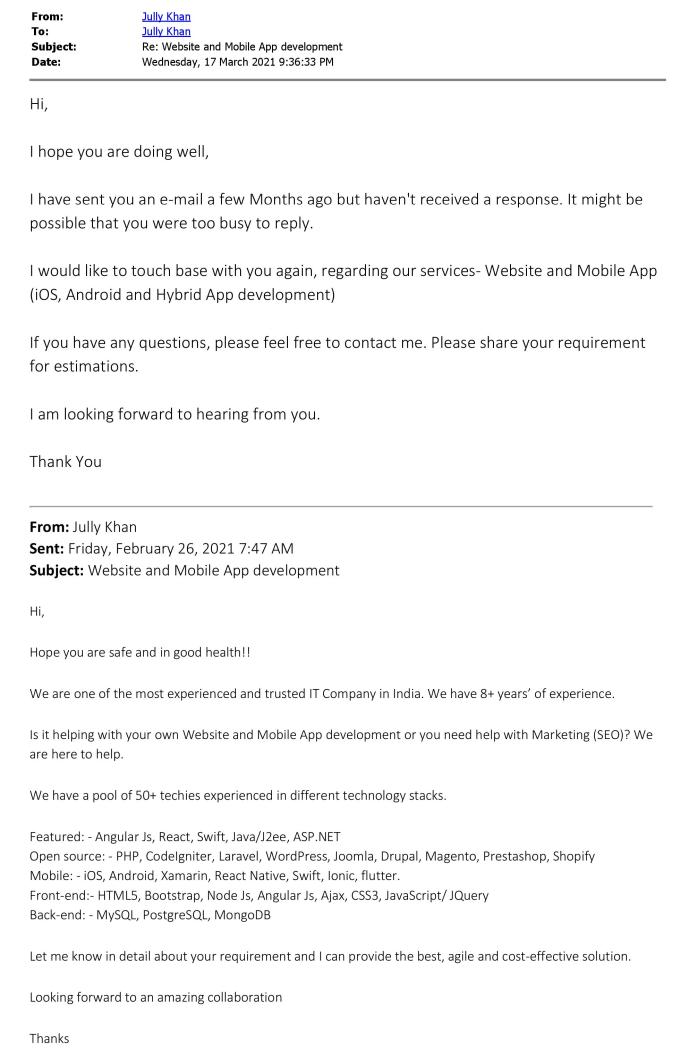
The Web Developer Companies
Sticking my hand up here and declaring I am biased on this one. Yes, I build websites. No, there is no way on earth that I would spam the crap out of people I don’t know or have never met to try to get them to let me build their website.
An effective website delivers you leads and new clients. Having to spam people silly to try and get leads is the mark of a business that is dodgy and ineffective. If they can’t get leads from their own website, how good are they going to be at getting results for your website?
If you get an unsolicited email about your website, then feel free to shred it – accompanied by gloriously waving middle fingers.
If you want a new website, ask your connections for referrals and check out the portfolios of recommended companies to make sure they match your preferred style.
Web Development Wall of Shame
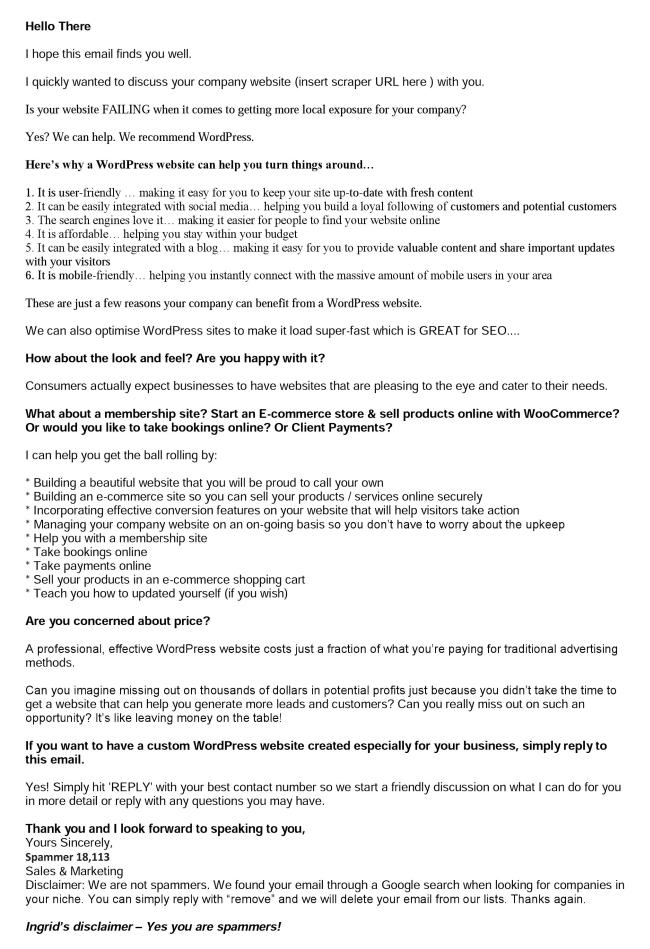
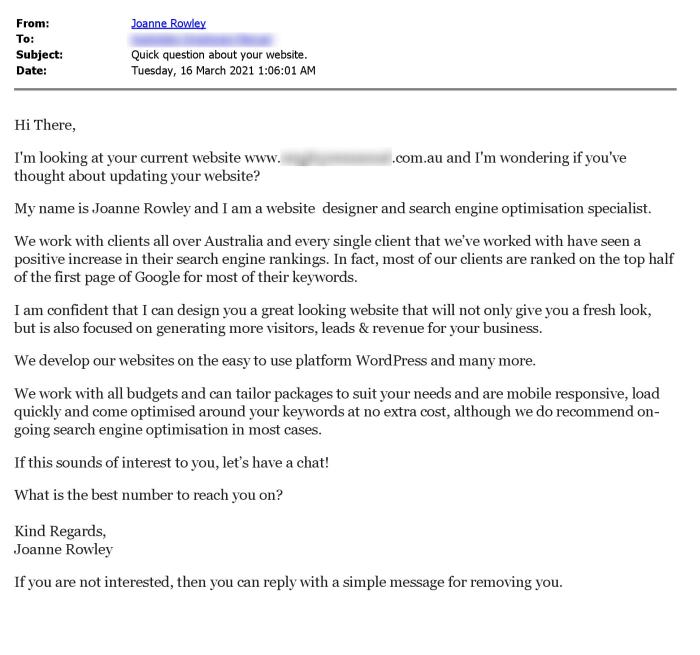
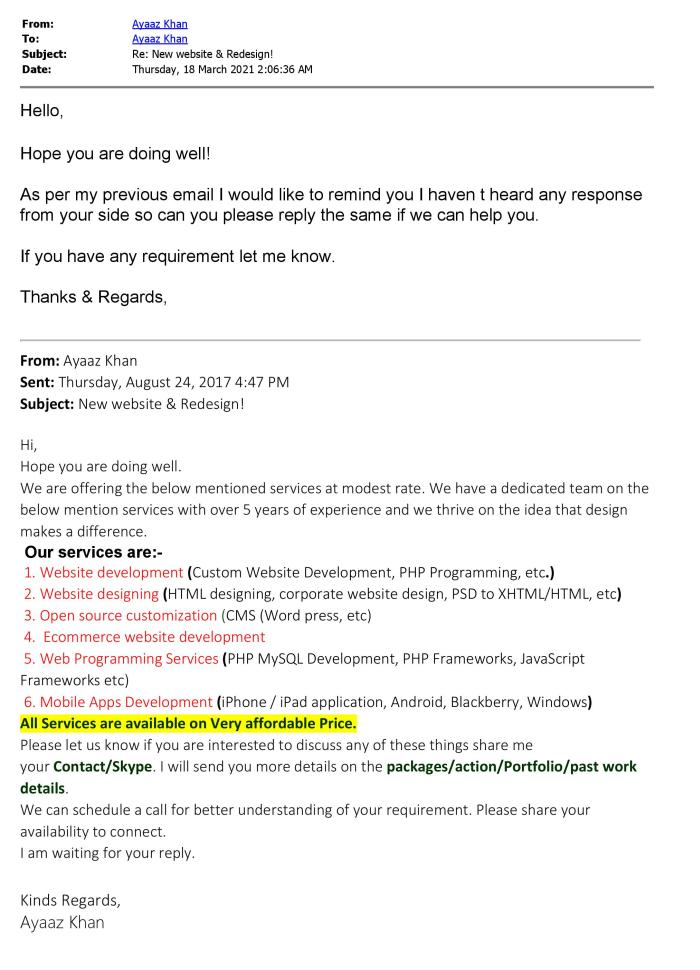
How do you find legitimate online marketing businesses?
If you want to market your business online, then start by looking for legitimate online marketing businesses that you can get to know and trust.
- Get a referral from someone you know who has actually used and loved their services.
- Check testimonials and recommendations. Don’t take them at face value.
- Check portfolios of work. Review work they have performed and talk with past clients to get a sense of what the company is like to work with.
- Shop local. Find a local business in your town or city as there are less likely to be language issues.
- Know exactly what you are getting for your money. Don’t trust it when they say they are ethical, ask specifically “how” they will deliver results, and how you will be able to monitor outcomes. Get this is in writing.
- Look at reports. Scammers and spammers rarely deliver detailed reports on what they have done during the month. Ask for copies of the monthly activity reports they give their clients so you can assess the depth of information they provide.

